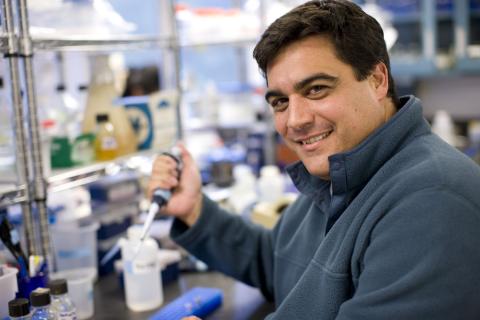Ignacio Provencio

Research Disciplines
Neuroscience
Research Interests
Sensory Neurobiology
Photoreception
Circadian Rhythms
Research Description
Light is critical for many biological processes. While vision is the most obvious of these, much of our "non-visual" physiology is regulated by light. For example, the internal 24-hour (circadian) clock that controls daily rhythms such as our sleep:wake cycle is reset by light. Responses that are controlled by the sympathetic system such constriction of the eye's pupil, the production of the hormone melatonin, or even heart rate are all regulated by light to some degree. Many of these non-visual responses to light are controlled, at least in part, by a recently discovered class of photoreceptor in the retina.
Melanopsin is the photopigment within these novel photoreceptors that renders them light-sensitive. Our lab is interested in understanding the role that these melanopsin-based photoreceptors play in various non-visual responses to light. In addition, we are trying to elucidate the biochemical details of the signaling cascade that is initiated by melanopsin activation. We hope that these studies will illuminate the broader impact of light on vertebrate physiology.
Selected Publications
Gao, J., Provencio, I., and Liu, X. (2022). Intrinsically photosensitive retinal ganglion cells in glaucoma. Front Cell Neurosci 16, 992747. 10.3389/fncel.2022.992747.
Gao, J., Griner, E.M., Liu, M., Moy, J., Provencio, I., and Liu, X. (2022). Differential effects of experimental glaucoma on intrinsically photosensitive retinal ganglion cells in mice. J Comp Neurol 530, 1494-1506. 10.1002/cne.25293.
Ksendzovsky, A., Pomeraniec, I.J., Zaghloul, K.A., Provencio, J.J., and Provencio, I. (2017). Clinical implications of the melanopsin-based non-image-forming visual system. Neurology 88, 1282-1290. 10.1212/WNL.0000000000003761.